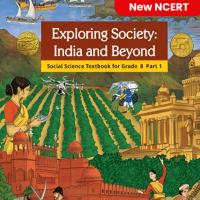Class 8 Exam > Class 8 Questions > Digestion is also called as a combustion?
Start Learning for Free
Digestion is also called as a combustion?
Most Upvoted Answer
Digestion is also called as a combustion?
Digestion as Combustion
Digestion is a process that breaks down food into smaller molecules so that they can be absorbed and utilized by the body. It involves a series of physical and chemical processes that occur in the digestive system. The process of digestion is often compared to combustion, which is a chemical reaction that occurs when a substance reacts with oxygen to release energy in the form of heat and light. Here are the details on how digestion can be compared to combustion.
Chemical Reactions in Digestion
The process of digestion involves several chemical reactions that break down food into their component molecules. These reactions include:
1. Hydrolysis: This is a process where water is used to break down complex molecules into smaller molecules. For example, enzymes in the digestive system break down carbohydrates into simple sugars like glucose.
2. Proteolysis: This is the process where enzymes break down proteins into amino acids.
3. Lipolysis: This is the process where enzymes break down fats into fatty acids and glycerol.
4. Fermentation: This is a process where bacteria in the gut break down certain types of carbohydrates into gases like methane and carbon dioxide.
Energy Release in Digestion
During digestion, energy is released as a result of the chemical reactions that break down food molecules. This energy is used by the body for various processes like muscle contraction, nerve impulses, and the synthesis of new molecules. The energy released during digestion is similar to the energy released during combustion.
Comparison between Digestion and Combustion
Both digestion and combustion involve chemical reactions that break down complex molecules into simpler ones. In both processes, energy is released as a result of the chemical reactions. However, there are some differences between the two processes:
1. In digestion, the energy released is used by the body for various processes, while in combustion, the energy is released in the form of heat and light.
2. In digestion, the reactions occur slowly and are controlled by enzymes, while in combustion, the reactions occur rapidly and are not controlled.
3. In digestion, the products of the reactions are small molecules that can be absorbed by the body, while in combustion, the products are gases like carbon dioxide and water.
Conclusion
In conclusion, digestion can be compared to combustion because both involve chemical reactions that break down complex molecules into simpler ones and release energy. However, the energy released during digestion is used by the body for various processes, while in combustion, the energy is released in the form of heat and light.
Digestion is a process that breaks down food into smaller molecules so that they can be absorbed and utilized by the body. It involves a series of physical and chemical processes that occur in the digestive system. The process of digestion is often compared to combustion, which is a chemical reaction that occurs when a substance reacts with oxygen to release energy in the form of heat and light. Here are the details on how digestion can be compared to combustion.
Chemical Reactions in Digestion
The process of digestion involves several chemical reactions that break down food into their component molecules. These reactions include:
1. Hydrolysis: This is a process where water is used to break down complex molecules into smaller molecules. For example, enzymes in the digestive system break down carbohydrates into simple sugars like glucose.
2. Proteolysis: This is the process where enzymes break down proteins into amino acids.
3. Lipolysis: This is the process where enzymes break down fats into fatty acids and glycerol.
4. Fermentation: This is a process where bacteria in the gut break down certain types of carbohydrates into gases like methane and carbon dioxide.
Energy Release in Digestion
During digestion, energy is released as a result of the chemical reactions that break down food molecules. This energy is used by the body for various processes like muscle contraction, nerve impulses, and the synthesis of new molecules. The energy released during digestion is similar to the energy released during combustion.
Comparison between Digestion and Combustion
Both digestion and combustion involve chemical reactions that break down complex molecules into simpler ones. In both processes, energy is released as a result of the chemical reactions. However, there are some differences between the two processes:
1. In digestion, the energy released is used by the body for various processes, while in combustion, the energy is released in the form of heat and light.
2. In digestion, the reactions occur slowly and are controlled by enzymes, while in combustion, the reactions occur rapidly and are not controlled.
3. In digestion, the products of the reactions are small molecules that can be absorbed by the body, while in combustion, the products are gases like carbon dioxide and water.
Conclusion
In conclusion, digestion can be compared to combustion because both involve chemical reactions that break down complex molecules into simpler ones and release energy. However, the energy released during digestion is used by the body for various processes, while in combustion, the energy is released in the form of heat and light.
Community Answer
Digestion is also called as a combustion?
Digestion is not an example of combustion but it is similar. Digestion is an endothermic process where energy is utilized to break down the complex food molecules into simple forms. In a combustion reaction carbon dioxide, water, energy and some by products are released.

|
Explore Courses for Class 8 exam
|

|
Question Description
Digestion is also called as a combustion? for Class 8 2025 is part of Class 8 preparation. The Question and answers have been prepared according to the Class 8 exam syllabus. Information about Digestion is also called as a combustion? covers all topics & solutions for Class 8 2025 Exam. Find important definitions, questions, meanings, examples, exercises and tests below for Digestion is also called as a combustion?.
Digestion is also called as a combustion? for Class 8 2025 is part of Class 8 preparation. The Question and answers have been prepared according to the Class 8 exam syllabus. Information about Digestion is also called as a combustion? covers all topics & solutions for Class 8 2025 Exam. Find important definitions, questions, meanings, examples, exercises and tests below for Digestion is also called as a combustion?.
Solutions for Digestion is also called as a combustion? in English & in Hindi are available as part of our courses for Class 8.
Download more important topics, notes, lectures and mock test series for Class 8 Exam by signing up for free.
Here you can find the meaning of Digestion is also called as a combustion? defined & explained in the simplest way possible. Besides giving the explanation of
Digestion is also called as a combustion?, a detailed solution for Digestion is also called as a combustion? has been provided alongside types of Digestion is also called as a combustion? theory, EduRev gives you an
ample number of questions to practice Digestion is also called as a combustion? tests, examples and also practice Class 8 tests.

|
Explore Courses for Class 8 exam
|

|
Signup for Free!
Signup to see your scores go up within 7 days! Learn & Practice with 1000+ FREE Notes, Videos & Tests.


















